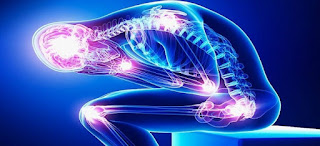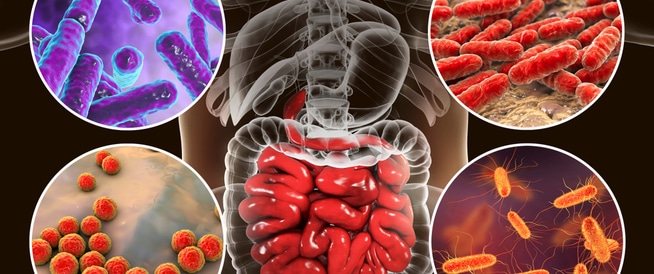Infections: Your comprehensive guide
Infections may be a major cause of recovery, and may be the
cause of some chronic diseases, so we offer you everything related to
infections in this article.
Infections help repair a wound or fight disease,
but if the immune cells start to work excessively, that inflammation can go
against us, causing many diseases and serious complications. Here is the most
important information related to infections:
Infections: definition
Inflammation
is a natural and protective reaction of the body to infectious organisms, such
as: bacteria , or viruses, but if this inflammation does not
stop in time, then immediate medical intervention is required.
Characteristic signs of
inflammation
There
are several symptoms that tell you that you suffer from infections, which are
the following:
· Inflamed areas are warm.
· Pain in the joints .
· Swelling and redness of the affected area.
· fever and feeling cold
· Fatigue and loss of energy.
· Headache and
loss of appetite.
Causes of infections
The following are the main reasons
why the body is exposed to infections:
·
Microbial infection, whether bacteria
or various viruses.
·
Exposure to trauma, such as: cuts,
scrapes, or some burns.
·
Tumors of all kinds.
·
A significant increase in temperature
or a sharp decrease in temperature.
Types of infections
There are two main types of
infections, know them:
·
Acute inflammation
·
It is a series of processes that start with excess
blood flowing to the site of the injury, causing inflammation, such
as: gingivitis .
·
Chronic inflammation
·
It occurs when the immune system is affected by a
defect or disturbance in the performance of its main function, as white
blood cells begin to attack healthy tissues and organs in the body,
causing autoimmune diseases.
Negative effects of inflammation
There are ways in which inflammation
affects our health, and they are as follows:
Sorry,
the video player failed to load.(Error Code: 101102)
1.
Arthritis
2.
It is a chronic
inflammation that often leads to rheumatoid arthritis, as it causes joint
swelling, which in turn negatively affects the cartilage and bones.
3.
High risk of cancer
4.
Many
scientific studies have linked recurrent infections with lung cancer,
esophageal cancer, cervical cancer, and gastrointestinal cancer
, because recurrent infection leads to a deterioration in immune regulation,
and creates an optimal environment for the growth of cancer cells.
5.
Heart disease
6.
Viral infection usually
causes myocarditis, which reduces its ability to pump oxygenated blood to the
various parts of the body, and causes an overall disorder of the heart system.
7.
Encephalitis
8.
It is an inflammation of
the brain tissue and there are many causes, but the most common cause is a
viral infection, and encephalitis causes confusion in thinking, and
problems with the senses and movement.
9.
Inflammation in the lungs
10.
Inflammation in the lung
can cause fluid to collect and narrow the airway, making breathing difficult.
11.
Inflammation may be the
direct cause of many diseases related to the respiratory system, such as:
asthma and bronchitis.
12.
Inflammation of the
intestine
13.
It is a chronic disease
that causes inflammation in various parts of the digestive system, and its
symptoms include abdominal pain, fatigue, rectal bleeding, night sweats, and
decreased appetite.
14.
Hepatitis C virus
15.
It is a virus in the blood
that infects liver cells, and may eventually lead to serious liver damage,
liver failure, or liver cancer.
16.
Vaginal infections in women
17.
It is an inflammation of
the vagina that may lead to discharge, itching and pain, usually due to a
change in the normal balance of vaginal bacteria or infection.
18.
Vasculitis
19.
It is an inflammatory
condition of the blood vessels that occurs when the immune system mistakenly
attacks a blood vessel, damaging the lining of the vessel, reducing or stopping
blood flow altogether.
Infection treatment
Infections are treated with:
1. Medication treatment
When the inflammation is caused by a
microbial infection, the inflammation is treated by antibiotics, and
non-microbial infections are treated by non-steroidal anti-inflammatory drugs,
such as: ibuprofen and Paracetamol, which prevent white blood cells from
destroying healthy tissue in the body.
2. Food therapy
Inflammation can be reduced by eating
certain foods, such as:
- Nuts: Nuts contain elements that calm inflammation and protect body cells.
- Raisins:
Raisins contain antioxidants
that help calm inflammation.
- Ginger:
Ginger contains anti-inflammatory
and antioxidant properties, which help protect the cells of the body from
infections.
- Fruits
and vegetables: These are foods rich in
antioxidants.
- Garlic:
Garlic contains powerful antioxidants
that fight microbes, and garlic strengthens the immune system that
protects the body from infections.
- Thyme oil: It has various nutritional and health benefits, including
treating some respiratory infections, and ridding the body of viruses and
parasites that attack the body.


Comments
Post a Comment
Subtract your idea